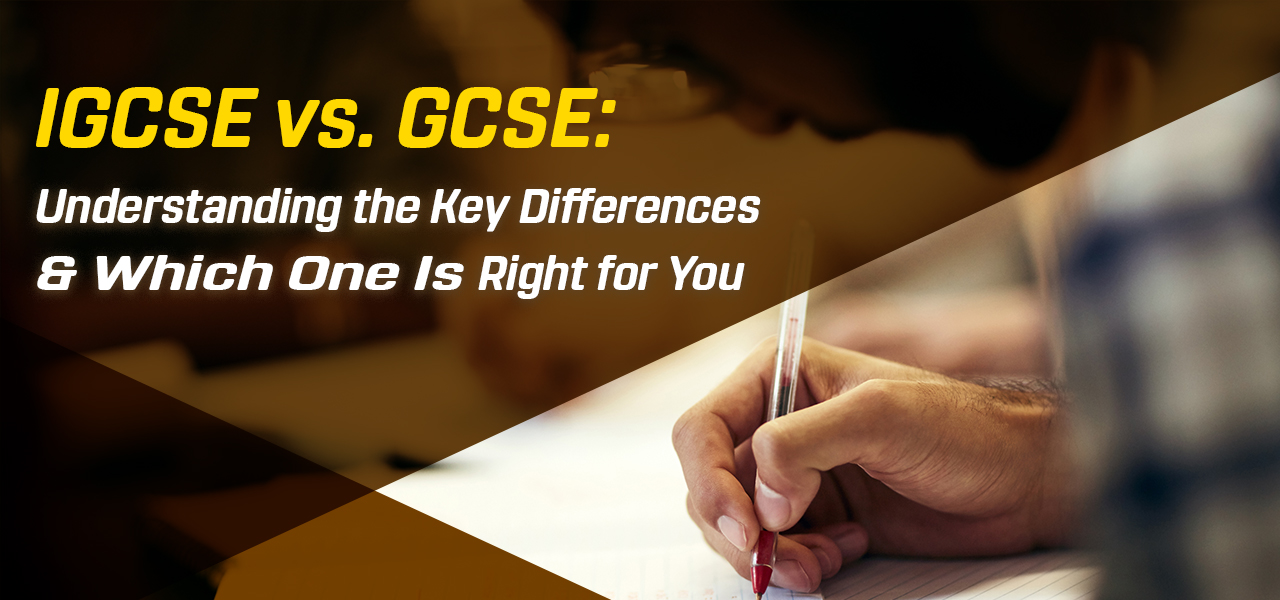
IGCSE vs. GCSE: Understanding the Key Differences and Which One Is Right for You
Choosing the right educational pathway is crucial for students aiming for global success. In Singapore, two prominent options are the International General Certificate of Secondary Education, IGCSE in Singapore and the General Certificate of Secondary Education, GCSE in Singapore. This article delves into the key differences between these curricula and guides you in selecting the most suitable one.
Understanding IGCSE in Singapore
The IGCSE in Singapore is an internationally recognized qualification offered by many international schools. Designed to cater to a global audience, the IGCSE curriculum emphasizes a broad and balanced education, encouraging critical thinking and problem-solving skills.
Levels of IGCSE in Singapore
The IGCSE offers a core and extended curriculum. The core level provides a basic understanding of subjects, while the extended level offers a more in-depth study, catering to students aiming for higher academic achievements.
Comprehensive Guide to IGCSE in Singapore
1. Subject Variety:
Students can choose from a wide range of IGCSE subjects, including languages, sciences, humanities, and arts, allowing them to tailor their education to their interests and career aspirations.
2. Assessment Methods:
The IGCSE exam structure includes written, oral, and practical assessments, providing a holistic evaluation of a student’s capabilities.
3. Global Recognition:
IGCSE qualifications are recognized by universities and employers worldwide, making it ideal for students planning to pursue higher education abroad.
4. Flexibility:
The curriculum offers flexibility in subject combinations, enabling students to focus on areas they are passionate about.
5. Skill Development:
Emphasis is placed on developing analytical and critical thinking skills, preparing students for the challenges of higher education and the global workforce.
Understanding GCSE in Singapore
While the GCSE in Singapore is less prevalent, some institutions offer it to cater to students following the UK education system. The GCSE curriculum is traditionally designed for students in the UK and focuses on a comprehensive understanding of subjects with a significant emphasis on coursework.
Levels of GCSE in Singapore
GCSEs are typically studied at a single level, with assessments designed to cater to a wide range of abilities. Students are evaluated through a combination of coursework and final examinations.
Comprehensive Guide to GCSE in Singapore
1. Coursework Emphasis:
The GCSE exam structures a significant portion of coursework, allowing students to demonstrate their understanding over time.
2. Subject Range:
A broad selection of GCSE subjects is available, covering core areas like English, Mathematics, and Science, as well as electives such as Arts and Humanities.
3. Assessment Style:
Assessments are designed to test a student’s knowledge comprehensively, with a mix of multiple-choice, short answer, and essay-type questions.
4. UK Alignment:
The curriculum aligns closely with the UK education system, making it suitable for students planning to pursue further studies in the UK.
5. Skill Application
Focuses on applying knowledge to real-world scenarios, enhancing practical understanding and problem-solving abilities.
IGCSE vs. GCSE in Singapore: Key Differences
1. International Focus:
The IGCSE is designed with an international perspective, making it more suitable for students in Singapore’s multicultural environment. In contrast, the GCSE has a UK-centric approach.
2. Assessment Methods:
IGCSE assessments are primarily exam-based, while GCSEs incorporate a higher percentage of coursework.
3. Curriculum Flexibility:
IGCSE offers more flexibility in subject choices, allowing students to tailor their studies. GCSEs have a more structured curriculum with mandatory subjects.
4. Recognition:
Both qualifications are globally recognized, but the IGCSE is often preferred by international schools and universities due to its global relevance.
5. Adaptability:
The IGCSE curriculum is adaptable to various educational contexts, making it more suitable for Singapore’s diverse student population.
How The eTutor Home Assists You?
For students in India seeking guidance on these curricula, The eTutor Home offers customized online courses and tutoring for both IGCSE and GCSE. Their expert tutors provide personalized learning plans, helping students understand the nuances of each curriculum and choose the path that aligns best with their academic goals. With flexible scheduling and a focus on individual strengths, The eTutor Home ensures that each student receives the support they need to excel.
Conclusion
Choosing between the IGCSE and GCSE in Singapore depends on individual academic goals, learning preferences, and future plans. The IGCSE offers an international perspective with flexible subject choices, while the GCSE provides a structured curriculum aligned with the UK education system. Assess your objectives and consult with educational experts to make an informed decision that will pave the way for your academic success.
Recent Posts
- IB, GCSE, and A Levels Got You Stressed? Get Help with 1-on-1 Online Tutoring
- Your Ultimate Guide to IGCSE and GCSE: AQA, O-Level, AS, and A-Level Explained
- How to Ace IB DP & A Levels – Study Hacks for Indian Students
- How US Students Can Excel in IB DP, GCSE, and A Levels
- Everything You Need to Know About the AP Curriculum: Courses, Benefits & Exam Tips
- Top Study Tips for IBDP Students: How to Excel in the International Baccalaureate
